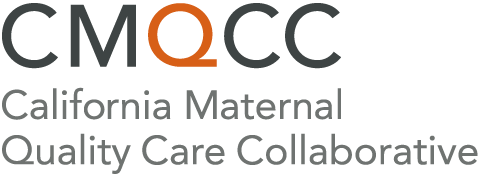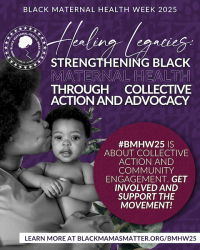 Black Maternal Health Week 2025
Black Maternal Health Week 2025
April 9, 2025
This year marks the 8th annual Black Maternal Health Week, a campaign founded and led by the Black Mamas Matter Alliance to build awareness, activism, and community to amplify the voices, perspectives and lived experiences of Black pregnant women and birthing people.
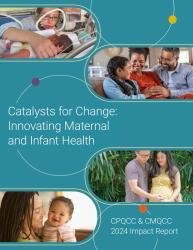 CPQCC & CMQCC 2024 Impact Report
CPQCC & CMQCC 2024 Impact Report
April 8, 2025
CPQCC and CMQCC's 2024 impact report, "Catalysts for Change: Innovating Maternal and Infant Health," outlines our work in 2024 as the California Perinatal Quality Collaborative.
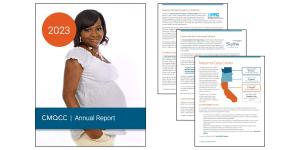 CMQCC Releases 2023 Annual Report
CMQCC Releases 2023 Annual Report
July 3, 2024
 Angela's Story: "I want people to know how serious preeclampsia is"
Angela's Story: "I want people to know how serious preeclampsia is"
May 31, 2024
When Angela Jones became pregnant for a second time in 2022, she had five risk factors for preeclampsia – she is Black, over 35, overweight, lower income, and her daughter was born nearly 20 years prior.
 CMQCC & CPQCC Announces New Co-Chairs & Principal Investigators
CMQCC & CPQCC Announces New Co-Chairs & Principal Investigators
February 26, 2024
The California Maternal (CMQCC) and Perinatal (CPQCC) Quality Care Collaboratives are thrilled to announce the appointment of new Co-Chairs and Principal Investigators.
 Discussing risk respectfully: How to talk about preeclampsia and low-dose aspirin with patients
Discussing risk respectfully: How to talk about preeclampsia and low-dose aspirin with patients
December 7, 2023
Low-dose aspirin (LDA) is remarkably effective at preventing preeclampsia, a serious pregnancy complication associated with maternal and infant morbidity and mortality.
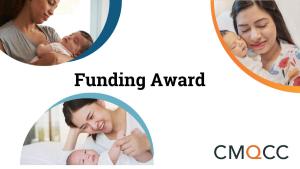 U.S. Health Resources & Services Administration Awards California a $10 Million State Maternal Health Innovation Award
U.S. Health Resources & Services Administration Awards California a $10 Million State Maternal Health Innovation Award
October 23, 2023
U.S. Health Resources & Services Administration awards California a $10 Million State Maternal Health Innovation Award
California Maternal Quality Care Collaborative at Stanford University School of Medicine to lead coordination with state health agencies
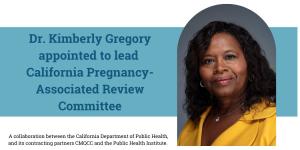 Dr. Kimberly Gregory appointed to lead California Pregnancy-Associated Review Committee
Dr. Kimberly Gregory appointed to lead California Pregnancy-Associated Review Committee
September 14, 2023
Kim Gregory, MD, MPH, is the new chair of the California Pregnancy-Associated Review Committee (CA-PARC) formerly known as the California Pregnancy-Associated Mortality Review (CA-PAMR).
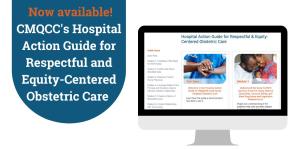 New CMQCC Equity Tool for California Hospitals
New CMQCC Equity Tool for California Hospitals
September 14, 2023
With the goal of improving maternal outcomes for all women and birthing people, CMQCC and its partners developed The Hospital Action Guide for Respectful and Equity-Centered Obstetric Care (Hospital Action Guide).
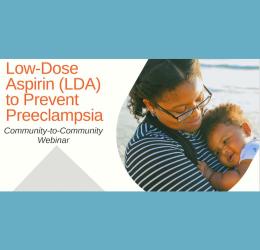 Low-Dose Aspirin Campaign Community-to-Community Webinar
Low-Dose Aspirin Campaign Community-to-Community Webinar
June 28, 2023
You are invited to a webinar tailored for community organizations to learn more about the Low-Dose Aspirin (LDA) Partnership Campaign on June 29, 11 a.m. Community organizations have the experience, understanding, and relationships to connect birthing people and families with this important information. We hope you will join us.
